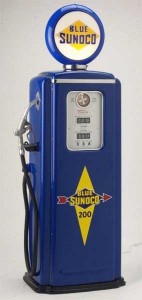
Is it time to raise the federal fuel tax?
So, when did so many Republicans start sounding like Democrats? I know, I know, President Obama is all about a “post-partisan” America, and it’s not uncommon to hear even the most vociferous political opponents making nicey-nice with each other in the first weeks after an inauguration. But what I’m talking about is a serious, seemingly heartfelt transformation by some of the auto industry’s most traditional members of the Grand Old Party. Like Bob Lutz, GM’s Vice Chairman. Like Michael Jackson, the CEO of retail giant AutoNation.
No, they’re not going off on gay marriage, or national day care. But they are touching upon one of the traditional “third rails” of American politics, something even the most hard-core “tax-and-spend” Democrats have largely chosen to sidestep, in recent years. And that’s the idea of a stiff, new gas tax.
Go to Europe and a good 80% of what you pay at the pump is tax, as much as $8 a gallon – at the current exchange rate – in some countries, or about 40 times what Americans pay in the federal fuel tax. And the number hasn’t changed in two decades, here at home, even though much of the world has consciously increased fuel taxes in order to discourage demand, promote the sale of fuel-efficient vehicles and, of course, balance their budgets.
There are, of course, plenty of environmentalists who’d like to see the U.S. catch up. But the Sierra Club and the World Wildlife Federation aren’t going to move the political needle. If anything, it may take the loyal opposition, and the industrial side of the Republican Party seems to be rushing in to fill that gap.
The lack of a coherent U.S. energy policy is “crazy,” declared Jackson, during a speech at the well-attended Automotive News World Congress, in Detroit, this morning. That’s all the more absurd, he added, in light of the new federal mandate requiring automakers to raise their Corporate Average Fuel Economy, or CAFÉ, to an average 35 miles per gallon. Without an effective way of motivating consumers – and higher prices seem the only effective way to do that – Jackson warns there will be a real “disconnect.” Consider that before fuel prices started climbing, Jackson had to cut back on the number of Prius hybrids he took from Toyota. When gas hit $4, he couldn’t get enough. Now, with gas back below $2 a gallon, “We can’t give them away.”
Now add the huge new costs we’re expecting to meet the new CAFE standard, and you can see why the industry is scared, and why Jim Farley, Ford’s marketing czar, made a clear call for a national energy policy, this week; and though he didn’t say whether that includes a higher fuel tax, it’s hard to imagine a well-executed policy that wouldn’t.
For his part, GM’s Lutz walks right up to the fence, suggesting that the current price of fuel only encourages consumers to keep buying big trucks, not small, fuel-efficient cars. He’s reluctant to actually say the words, “raise my (gas) taxes,” largely because it isn’t official GM policy. But the septuagenarian executive still finds a way to make it clear that course is the only viable approach.
For his part, Jackson recognizes that in a deep recession, like ours, you offer tax cuts and stimulus packages. But he suggests that it is time to announce that an increase of $1 a gallon will be phased in, perhaps over a five-year period, and then set a firm date to begin.
Will the idea fly? There are plenty of folks in and around the Obama Cabinet who believe that a tax increase is essential. In fact, they argue it would serve the national defense, since higher prices would provoke energy savings – and reduce the Yankee dollars that go to folks in Saudi Arabia, Russia and Venezuela. But getting Americans to accept the idea could prove a political nightmare, especially if Republicans were to use it as a wedge with voters. On the other hand, bringing together a coalition of moderates, liberal “greenies” and conservative industrialists, could provide both political cover – and help get the message across to skeptical American motorists.
